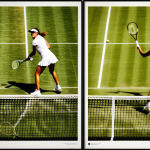Understanding Stress in Competitive Darts
In the world of competitive darts, understanding the psychology of stress is crucial. Performance anxiety significantly impacts the success of professional players, often stemming from the high stakes of the game. Stressors include pressure to win, the presence of an audience, and the formidable reputation of opponents, all contributing to the mental burden on athletes.
Stress not only affects physical execution but has profound psychological effects, causing distractions or negative thinking. This can manifest as a loss of focus, increased muscle tension, or poor concentration during critical moments. Competitive environments often exacerbate these issues, making stress management skills paramount for dart players.
Also to read : Navigating Crisis: Top Media Strategies Every UK Sports Manager Needs
Psychologically, the stress of competition can lead to performance anxiety, negatively influencing game outcomes. That’s where effective stress management techniques become invaluable, allowing players to maintain composure and execute their skills under pressure. Techniques such as controlled breathing and mental conditioning play a significant role in mitigating the effects of anxiety.
By addressing these stressors and learning to manage them effectively, athletes not only enhance their performance but also enjoy the game more. Understanding and implementing these strategies is integral to any darts player aiming to reduce stress and improve performance efficiency during matches.
This might interest you : The Brexit Effect: Transforming UK Sports Teams and European Competitions
Insights from Professional Players
Professional darts players often share anecdotes about managing stress during competitions. One UK player noted the importance of structured mental strategies, emphasising that a focused mind can transform high-pressure environments into opportunities for success. This includes setting clear goals and visualising achieving them before stepping up to the oche.
Expert advice from seasoned players consistently highlights the necessity of building resilience through mental exercises. Players suggest incorporating mental conditioning routines that foster a calm and stable mental environment, reducing anxiety before matches. An essential component of their mental toolkit is visualisation—imagining each dart’s trajectory and mentally rehearsing the game.
Lessons from competitive experience reveal a myriad of shared techniques, including creating a personalised pre-game mental checklist. Such strategies enable players to centre their thoughts, allowing clarity and aiding in maintaining composure during crucial moments. These techniques create a strong foundation for achieving optimal performance.
Overall, shared insights underscore the paramount importance of mental preparedness. By learning from these expert strategies, aspiring players can enhance their gameplay and manage stress effectively, ultimately improving their performance efficiency on the dartboard.
Exercises for Maintaining Calm and Focus
In competitive darts, maintaining a calm and focused state is essential for peak performance. Implementing effective mindfulness techniques can help players stay composed and sharp during matches.
Breathing Techniques
Breathing exercises are simple yet highly effective in reducing stress and enhancing focus. They work by promoting relaxation and helping to clear the mind of distractions. Focusing on slow, deep breaths can reduce heart rate and muscle tension, especially under pressure.
Mindfulness Practices
Practising mindfulness before and during matches can significantly improve concentration. Techniques such as body scans, where players direct their attention to various body parts progressively, help in grounding the mind and alleviating anxiety. Encouraging a present-focused mindset aids dart players in tuning out distractions from the audience or competition stressors.
Quick Mental Exercises
Utilising quick mental exercises can also aid in refocusing a player’s attention. One effective method is the use of positive affirmations, which boosts confidence and reduces self-doubt. Simple tasks, like visualising a successful dart throw, help reinforce a positive mindset. These techniques work well for those crucial moments when maintaining composure is key to performing well.
Post-Game Reflection and Adjustments
After competing in a high-stakes darts match, engaging in performance reflection is key to continuous improvement and effective stress management. Players should review their game to identify both strengths and areas needing development. Reflective practices provide insights into moments where focus faltered and success was achieved.
Evaluative Techniques
- Video Analysis: Watching match recordings helps players pinpoint where critical errors occurred and successful techniques were applied. This allows for a tactical analysis of both physical execution and mental focus.
- Journaling: Keeping a post-game journal aids players in documenting emotions and thoughts, facilitating a deeper understanding of their psychological state during matches.
Learning for Future Competitions
Using these reflections, players can adjust their mental frameworks and prepare differently for upcoming contests. This can involve tweaking mental conditioning routines or adjusting pre-game rituals to better suit discovered needs. Additionally, discussing outcomes with coaches or mentors provides external insights and validates observations.
Continuously evolving mental strategies and addressing recurring stress points can lead to enhanced performance optimization over time. By making reflective practices a routine part of game preparation, darts players harness each experience, turning losses or victories into valuable learning opportunities.
Psychological Techniques for Stress Management
In competitive darts, mastering mental conditioning is key to optimizing performance. Players often employ specific exercises to reinforce mental strength and focus. These focus techniques include setting achievable goals to guide concentration and ensure clear mental pathways, particularly under pressure.
Visualisation is another potent tool employed by players to sharpen their performance. By mentally rehearsing successful outcomes—such as envisioning precise dart trajectories—athletes bolster confidence and readiness. Visualisation simulates match-day pressure, enabling players to maintain a competitive edge.
To sustain focus amid high-pressure situations, routine use of mental exercises is essential. Techniques include practising deliberate attention shifts to return focus when distractions arise. Also, incorporating positive affirmations into daily practice reinforces mental resilience. These methods equip players to manage stress effectively during crucial game moments.
In building mental fortitude, players benefit from these tailored strategies, ensuring they remain calm and composed. Through consistent application of mental conditioning, focus techniques, and visualisation, competitive darts players enhance their likelihood of victory, even when faced with tense scenarios. Such psychological preparation is invaluable for achieving and maintaining peak performance.
Building a Pre-Game Routine
Players aiming for performance optimisation find tremendous value in establishing a consistent pre-game routine. This helps create a sense of familiarity and comfort, reducing anxiety before stepping onto the dartboard. Essentials like mental visualisation and breathing techniques form the core of effective preparations.
Importance of Consistency
Consistency in pre-game rituals fosters a calm and stable mindset, transforming nerves into concentration. Such routines often include ritualistic practices like specific warm-up sequences or listening to music to establish focus. This discipline ensures that players approach each match with an optimal, stress-reduced mindset.
Elements to Include
- Mental Conditioning: Setting clear, attainable goals visualised in advance boosts confidence.
- Physical Warm-Up: Simple exercises to loosen muscles and maintain physical readiness.
- Focus Techniques: Techniques like repeated breath cycles or meditation to enhance concentration.
Impact on Performance
Well-structured game preparation directly impacts competition results by ensuring that players remain composed under pressure. By methodically planning pre-game activities, players can mitigate stress, enhance their mental and physical readiness, and ultimately improve game outcomes. Establishing such routines becomes a vital tool for achieving consistency and excellence in competitive darts.





